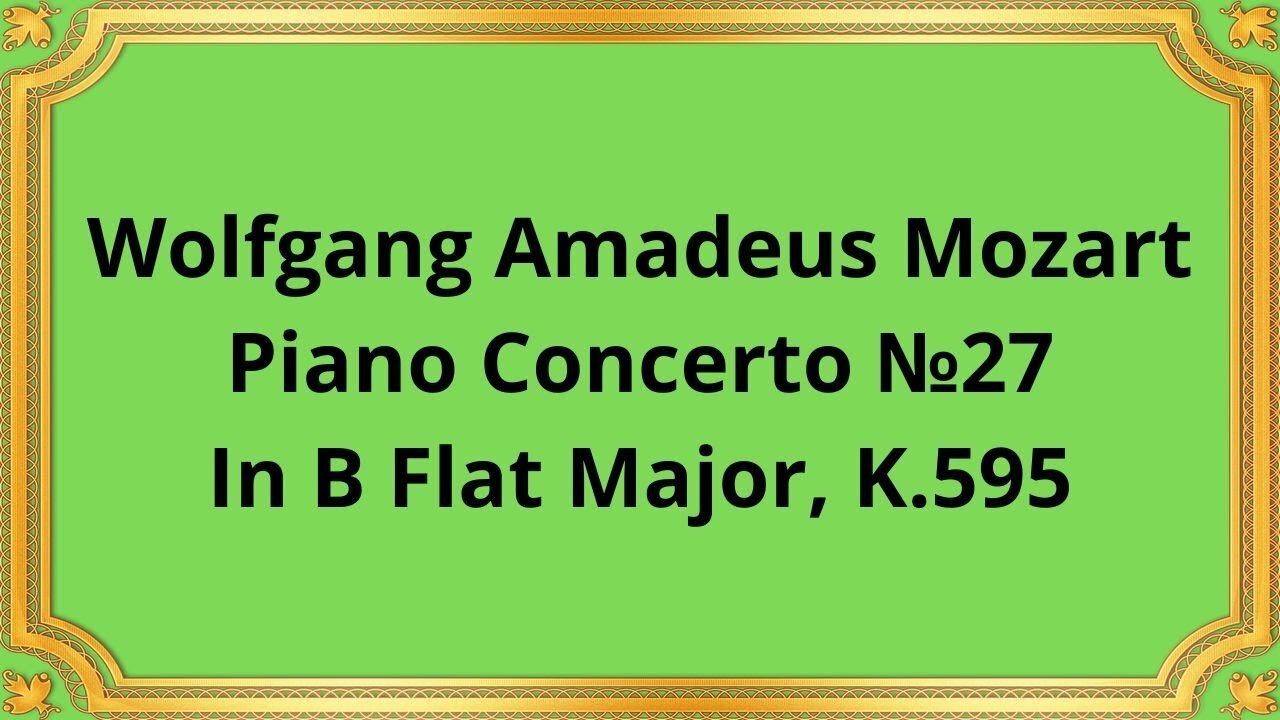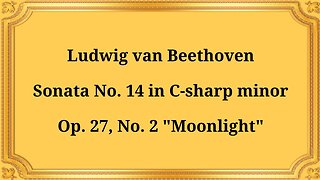Premium Only Content

Wolfgang Amadeus Mozart Piano Concerto №27 In B Flat Major, K.595
#Mozart #ClassicalMusic #PianoConcerto #BFlatMajor #K595 #MusicalComposition #MusicAppreciation #MusicHistory #Masterpiece #Composer
Publication date 1965
MICHELE BOEGNER, Piano SAAR RADIO CHAMBER ORCHESTRA, KARL RISTENPART, Conductor
Wolfgang Amadeus Mozart, a prolific and influential composer of the classical era, left an indelible mark on the world of music. Among his vast repertoire, the Piano Concerto No. 27 in B Flat Major, K.595 holds a special place.
Composed in 1791, during the final year of Mozart's life, Piano Concerto No. 27 showcases his mature compositional style. It was written shortly before his untimely demise, adding an air of poignancy and introspection to the work. This concerto represents the culmination of Mozart's artistic journey, embodying his exceptional skill and creative genius.
Mozart's Piano Concerto No. 27 follows the traditional three-movement structure, consisting of an allegro, larghetto, and allegro finale. The opening allegro movement introduces the main themes with its spirited and lively character. The second movement, larghetto, presents a contrasting mood, evoking a sense of tender melancholy through its graceful melodies. Finally, the concerto concludes with a lively and spirited allegro movement, showcasing Mozart's virtuosic writing for both the piano and the orchestra.
One of the defining features of this concerto is Mozart's ability to craft unforgettable melodies. The themes presented throughout the composition are rich in emotion and display a seamless integration between the solo piano and the accompanying orchestra. Additionally, Mozart expertly weaves intricate harmonic progressions, creating a sense of depth and complexity that captivates the listener's ear.
The Piano Concerto No. 27 highlights Mozart's exceptional understanding of the piano as an instrument. The solo piano part is exquisitely written, featuring delicate passages, powerful flourishes, and moments of introspection. Mozart's command of the instrument is evident in the nuanced dynamics, precise articulation, and seamless integration of the soloist with the orchestra.
Beyond the technical brilliance, Mozart's Piano Concerto No. 27 is a window into his emotional world. The work displays a profound range of emotions, from joy and exuberance to introspection and melancholy. Through his masterful composition, Mozart invites the listener to experience a deeply personal journey, evoking a wide array of feelings and stirring the soul.
Conclusion:
Wolfgang Amadeus Mozart's Piano Concerto No. 27 in B Flat Major, K.595 stands as a testament to his exceptional musical talent and creative prowess. Its historical significance, melodic beauty, harmonic complexity, expressive piano writing, and emotional depth make it a true masterpiece of classical music. This composition continues to captivate audiences, reminding us of the timeless genius of Mozart and his profound impact on the world of music.
You have the opportunity to support the channel:
https://destream.net/live/RadSiarAl/donate
https://www.buymeacoffee.com/6355radsiaral
-
 18:26
18:26
Classical music_Music Inspiration
1 month agoLudwig van Beethoven Sonata No. 14 in C-sharp minor, Op. 27, No. 2 "Moonlight"
841 -

Spartan
5 hours agoHalo for a bit, Octopath after maybe
25K -
 2:58:09
2:58:09
SavageJayGatsby
6 hours agoSpicy Saturday with Mally! - Wedding in 2 Months!
41.8K1 -
 1:47:14
1:47:14
VapinGamers
8 hours ago $2.05 earnedTools of the Trade - Does Production Matter? with Tim the Tool Man from Louder with Crowder
26.3K2 -
 5:44:04
5:44:04
BSparksGaming
6 hours agoHappy Saturday! Battlefield 6 Beta! PS5 Gameplay
21.3K -
 15:53
15:53
Exploring With Nug
14 hours ago $3.92 earnedExploring Texas Creeks for Fossils – Prehistoric Treasures Everywhere!
32.9K5 -
 9:02
9:02
MattMorseTV
12 hours ago $15.50 earnedTrump's FBI just DECLASSIFIED the UNEDENIABLE PROOF.
42.8K94 -
 3:57:54
3:57:54
TinyPandaface
5 hours agoYour FACE is A Gaming Channel! | Mario Golf Super Rush w/ The Fellas!
7.88K2 -
 2:50:10
2:50:10
sophiesnazz
9 hours ago $4.12 earned6kd in these ghost lobbies !socials !specs
27.9K2 -
 25:39
25:39
MYLUNCHBREAK CHANNEL PAGE
1 day agoThey Already Had A.I.
53.9K44